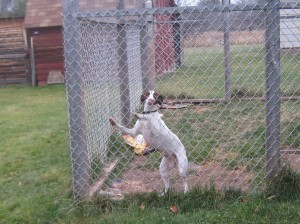The cat’s fur stood on end to make it appear larger and fiercer…
The little dog barked loudly, from the safe side of the fence…
The man sucked in his stomach as the woman on the beach walked by…

These are three common behaviors in nature. We cannot suppose that animals who try to appear formidable or fit do so for any other reason than to ward off predators. Even the beach enthusiast in the example has an instinctual reason to promote a not entirely true image of physical fitness.
But there are times that people perform in order to project a truth. Some of those times, the performer is only convincing herself or himself of that image. That is an instance of self-delusion or image ruse. Read more…
joebouchard Guest Author, Self Scrutiny, Staff relations
By Lt. Gary F. Cornelius (retired)
Recently I entered a new phase of my correctional career-conducting jail officer basic training in the Commonwealth of Virginia. After I retired from jail duty, I got back into writing and conducting jail in service training. I have now been asked to help out several academies by conducting state approved jail basic courses in legal matters, special inmate populations and suicide prevention.
I have to admit-I enjoy it. New recruits or what we affectionately like to call “rookies” not only need the book learning and skills training to pass the academy, but they need the wisdom and lessons learned by us veterans. All of us veterans who have worked in corrections a long time know that we are different at this point in our careers than when we started. Read more…
joebouchard Guest Author, Security, Staff relations, Training
By Paul Eyke M.S.
Psychologist
These are the opinions of Paul Eyke and not necessarily those of the Michigan Department of Corrections. The department is not responsible for the content or accuracy of the following.
Correctional systems since their inception have been tasked with the responsibility of “rehabilitating” inmates who were in their charge. There have been periods of enlightened correctional thinking in which inmates were provided with educational and vocational training in order to better prepare them for life after they left prison. Read more…
joebouchard Guest Author
By: Kenneth Demmo
Reflecting back on a career in Corrections: I have grown up quite a bit and had my share of self-induced hard times and great times throughout the years. One issue has been on my mind for some time now and I have come to realize or had an epiphany to a hidden dark secret of Corrections. Most of us never see it coming or realize that it affects us yet it has a profound affect on our lives both here at work and home. I am referring to the Hard-Hearted conditioning that we as Correctional staff experience. Read more…
joebouchard Guest Author
By LT. Gary F. Cornelius (retired)
I have to confess that I have always been known as the “class clown”. From grade school on, I reveled in doing impersonations, practical jokes, and telling puns. However, when I entered the field of corrections, I toned down the humor and toned up the seriousness of my profession. But, there was always room for humor.
I came across an article from the November-December 1996 issue of American Jails titled “Are We Too Serious? The Value of Humor in Jail Work” by William F. Waters, MS/MSW, an associate professor in the Criminal Justice Department at Northern Michigan University. Read more…
joebouchard Guest Author
In continuing our thoughts on the Security Classification Committee (SCC) we need to look at what types of segregation there are and how a prisoner gets into them.
“Throw him in the hole until we decide what to do with him” was the common phrase one use to hear from the Captain. How many times have there been incidents in the past where a prisoner gets placed in the hole and then is forgotten because the officer goes on vacation without writing the reports. The holidays come and no one in administration is around to decide what to do with the prisoner. Read more…
joebouchard Guest Author
During the last six months presenting Collaborative Case Management I have encountered a wonderful and diverse group of people that work in, for or outside the MDOC. The general reoccurring theme was their frustration with the lack of common sense in the department. Yet they diligently report to work and do their jobs 110% everyday. Read more…
joebouchard Guest Author
This article is a collaboration between Joe Bouchard & Caterina Spinaris Tudor
Veteran staff have many helpful, even life-saving tips to share with other staff and newbies. They have earned their wisdom from experience over the years, usually the hard way.

Here is a list of attitudes and actions of seasoned corrections staff which help them remain safe on the job and successful in their careers. Read more…
joebouchard Guest Author, Self Scrutiny
(From Richard Lumb, Ph.D.)
My comments are a follow-up to Joe and Ron’s November 13, 2009 posting on the use and application of resilience tools to help moderate the impact of stress and the encounter with adversity or trauma that ranges from minor discomfort to mind and body wrenching crisis. Daily pressure is inevitable and we often ride waves of discomfort with accompanying emotions usually returning to a place of balance where coping takes place naturally. Read more…
joebouchard Guest Author, Self Scrutiny, Staff relations
Recently, Institutional Training Officer Mike Plourde, developed a module called “Con Games”. “Con Games” addresses some of the ruses and manipulation that may be executed on corrections staff. He paired that with Joe Bouchard’s module “Wake up and Smell the Contraband”, encompassing the whys and hows of illicit activities inside the walls of corrections facilities. Part of that module which deals with trepidation because of manipulation is presented here.  Read more…
Read more…
joebouchard Guest Author, Self Scrutiny, Staff relations, Training




